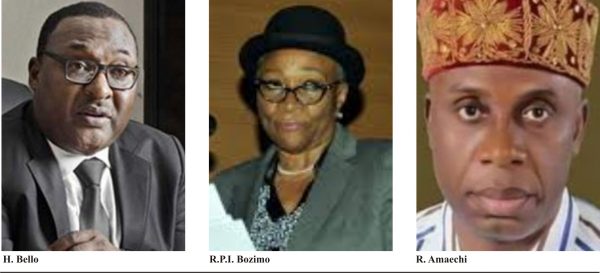 How time flies. Twenty three years ago, the International Maritime Seminar for Judges was conceived with the intent and objective of keeping the judges abreast with admiralty law and practice in Nigeria for easy administration and dispensation of cases in the maritime industry ,especially against the background that time is money.
How time flies. Twenty three years ago, the International Maritime Seminar for Judges was conceived with the intent and objective of keeping the judges abreast with admiralty law and practice in Nigeria for easy administration and dispensation of cases in the maritime industry ,especially against the background that time is money.
At the just concluded 15th edition of the programme in Abuja, Nigeria, there were over 150 Judges, over 100 lawyers drawn from different judicial jurisdictions in Nigeria and other West African countries, such as Ghana, Sierra Leone, Gambia.

The pride with which Suites and Coats worn by Justices and Judges were decorated with tags bearing “Hon Justices” could make one grin with envy. The class distinction among the members of the bench was neither noticed in age nor in the deployment and expression of jurisprudential lexicon at the seminar. The difference was in registration tags and cognitive reverence to court jurisdictional differences.
But this raised a writer’s urge into interrogating the difference between a Justice and a Judge, a quick digress to assuage the intrusive curiosity of a writer but could lead the way to appreciating the subject of discourse.

Judges and justices are court officials who make the final decision in every case that is brought to a court of law. Depending on the jurisdiction, they can sit on the bench anywhere between six to eight years. Judges and justices must retire at least by the age of 70. Judges work in lower level courts, such as district court and circuit court. In many states, judges are licensed attorneys who run for the public office of judge. Justices are found on a state’s Appeals Court and Supreme Court.

Unlike their counterparts in lower courts who work alone, appellate justices can consider cases in “panels,” meaning three justices can decide a case. A full court of justices may decide to join together to consider a more complex or prominent case.
Justices do not hold trials, but review documentation from the lower courts before making decisions. When necessary, justices will hear oral arguments from attorneys on specific cases, and will issue a written opinion at a later date. Lower court judges also issue written opinions, but there are times when they rule from the bench shortly after hearing oral arguments.
Maritime seminar for Judges like many professional learning platforms is not a leveler but a unifier, a networking forum hence the bench and the bar, academics, technocrats, among others converge every two years to jaw –jaw on maritime law and practice.
Since founded 1995, it has stimulated discussions that gave birth to some legislative and regulatory instruments. The Minister of Transportation, Mr. Rotimi Amaechi at the occasion noted this much.
“Submissions at the seminar have helped the government in making sound policies as well as legislative pronouncements in the field of maritime law and international trade. For instance, the establishment of regulatory bodies for the transport industry, appointment of the Nigerian Shippers’ Council to act as interim economic regulator for the ports, concessioning of seaports terminal operations to private sectors.” Amaechi who was represented by the Permanent Secretary in the Federal Ministry of Transportation, Mr. Sabiu Zakari.
The programme is organized by the Nigerian Shippers’ Council in collaboration with the National Judicial Institute(NJI). From the view point of the Administrator of NJI, Justice R.P.I. Bozimo,” The seminar offers opportunity for Judges to interact with stakeholders in the maritime industry on contemporary issues regarding shipping, international trade law and other related matters with a view imbibing international best practices in the sector.
“This is in addition to the overall objectives of improving the standard of maritime law practice as well as equip judges with necessary tools to dispense justice efficiently. The seminar largely achieved its objectives, as the jurisprudential landmark of Nigerian Admiralty Law has developed by way of copious case law and legislative enactments, all courtesy of the successes of the seminar over the years. Despite these laudable accomplishments, there is still room for improvement,” NJI boss added.
Participants at this year’s event believe that the attendance, participation in sessions and interest topics was the best so far, since inception.
However, the former Managing Director of NSC, Chief Adebayo Sarumi stressed the need for the council to spread its sensitization campaign to other stakeholders.
 MMS PLUS NG – Maritime, Aviation, Business, Oil and Gas News Online Newspaper with coverage in Maritime, Oil and Gas, Aviation, Power and Energy as well as Financial News
MMS PLUS NG – Maritime, Aviation, Business, Oil and Gas News Online Newspaper with coverage in Maritime, Oil and Gas, Aviation, Power and Energy as well as Financial News









